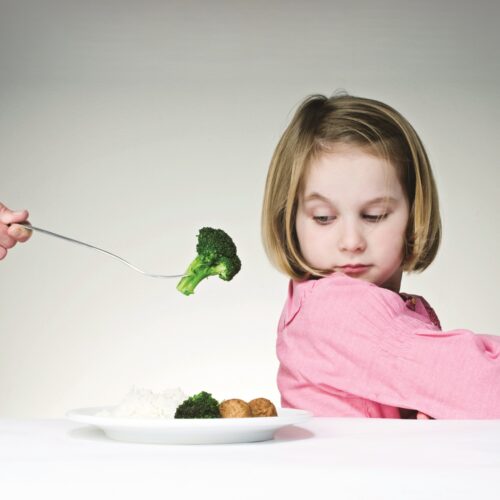
Childhood obesity is a growing problem in New Zealand. How do you tell a child they need to lose weight without destroying their self-esteem or giving them lifelong issues with food? Georgia Rickard talkes to the experts for some practical advice.
Obesity paradox
We've all heard theories on why obesity rates are rising, but Dr Boyd Swinburn, a Population Health professor from Deakin University (Australia), who specialises in childhood obesity, points out the causes are more complex than many of us realise.
"Genetics and society are often blamed for the epidemic, but our physiology hasn't changed, our genes haven't changed, and our basic social patterns haven't changed – so you can't just put it down to that."
He adds that eating has always been a social experience in our culture, rather than a physiological one. "It's not something new in the last 20 years." So if our genes and social eating are still the same, what has changed?
Physical environment
"The problem is environmental," Dr Swinburn explains. "The food environment has changed hugely; the electronic environment has changed hugely." Particularly, he says, we're seeing more aggressive marketing of food. "Look at the four 'Ps' of marketing: food 'prices' have decreased; 'products' have been changed to add more sugar, salt and fat so they taste good; food 'placement' is everywhere; and 'promotion': we're inundated with marketing for junk food."
Social environment
Children are not only influenced to overeat by a number of environmental factors, they're also taught that obesity and being overweight are undesirable.
"We live in a society which tells us to consume," says Dr Samantha Thomas, a health sociologist specialising in childhood obesity and deputy director at Australia's Monash University School of Primary Health Care. "But when we become overweight, we're told we're too fat, it's our own fault, and that we need to take personal responsibility of the problem. It's an impossible paradox."
Professor Stephen Touyz, a clinical psychologist who specialises in eating disorders, points out it's a paradox which can simultaneously prompt "restriction and emotional distress", leading to behaviours such as bingeing.
How to deal with it
"At the most simple level, obesity is caused by exercising too little and eating too much," states Dr Thomas. "But as we all know, it's not that simple." The factors contributing to any child's obesity are unique, so Dr Thomas believes that addressing the issue will always require an approach that deals not just with their physical health, but their emotional health, too.
To help you address the topic in a way that doesn't damage their self-esteem, consider the following 10 steps.
1. Use the right words
Dr Thomas advises to steer clear of the words 'weight-loss' and 'fat' at all costs.
"We know that for children who are very overweight, those two things have the potential to cause really damaging body image issues, as well as eating disorders and mental health problems," she says. "If you talk to adults who were fat as children, the most damaging things they went through as kids were often people telling them they needed to lose weight."
Instead, she says, you need to focus on improving their health.
"Instead of talking about becoming 'skinny', try 'Let's see how we can make you healthier. We want you to be fit and active and healthy and the best person you can be.'" Parents need to focus on health, not appearance and on more activity, not less food.
2. Do as you say
It's time for a reality check: if a child is overweight, their parents are more likely to be, too. In a 2004 study, researchers found that children with one obese parent were almost twice as likely to be overweight than children whose parents were of healthy weight. Children with two obese parents were almost two-and-a-half times more likely to be overweight. So it doesn't matter how many times you tell kids to eat their vegetables if you don't eat yours, says Professor Swinburn. "That's why the 'do as I say, not as I do' style of parenting is such a disaster," he says. To really help your children, you need to lead by example – and that may require you to address your own unhealthy behaviours.
"This is where the difference between adult and childhood obesity lies," says Dr Thomas. "Kids model what their parents do. And often, childhood obesity is really challenging for parents because they have unhealthy eating behaviours and may be a negative self-image of themselves," she says. What's important is for parents to decide that they don't want their kids to face the same problems they have and then resolve to break the cycle.
"Excuses like, 'it's just puppy fat' or 'he's tall for his age' don't help anyone – it's about changing your habits so your kids' habits change too." That doesn't mean forgoing treats all together, she adds: "It's about having biscuits [at hand], but knowing they are not an everyday food."
3. Make it a family challenge
Being overweight often promotes the avoidance of exercise, says Professor Swinburn.
"If an overweight child is embarrassed about [putting on] their swimming gear in PE class, for example, they might get a note from Mum saying they don't have to participate," he says. "They don't learn the skills, don't get fit, don't learn to enjoy exercise and don't lose weight."
But you can trick your child into exercising – by putting the entire house on a 'health programme'. Dr Thomas says the beauty of this is that it draws focus away from the child, so they don't feel as if there's something wrong with them.
"If only one sibling is overweight and the other isn't, you should all be participating in family walks, family bike rides, that kind of thing," he says. "Everyone can benefit from healthier foods and a more active lifestyle."
4. Watch your feeding style
When researchers analysed dinner table 'feeding styles' of parents with children aged between seven and 13, they found surprising results.
Parents who tried to exert too much control over their children's eating – banning certain foods or pressuring kids to eat certain foods – had children who were more likely to be overweight and less likely to eat vegetables and fruit than normal-weight kids. Allowing kids to eat any food they choose is also inappropriate. The same researchers found that kids who were allowed to eat whatever they wanted were also more likely to be overweight.
To help kids identify their natural food intuition, American dietitian Ellyn Satter recommends following the 'Division of Responsibility'. The adult decides what, when and where to feed children; and the child determines how much, and whether or not to eat.
5. Forget diets
Yes, the entire family should eat healthier, more nutritious foods, but that doesn't mean they should diet. "Diets don't last in the long term. They only make people gain weight," says Dr Thomas. Indeed, when US researchers administered a diet plan to children between the ages of seven and 12, the kids lost weight, but when they inevitably gained it back, they gained an average extra 2.6% of their body weight, too. "Dieting impedes your ability to listen to hunger cues, creates poor eating habits and, ultimately, may lead to a clinical eating disorder," observes Professor Touyz. "You're much better off focusing on balance, moderation and healthy eating, than on dieting."
6. Try a 'confidence booster'
The medical community remains divided on whether poor self-esteem leads to obesity, or whether obesity leads to poor self-esteem, but Dr Thomas says there's clearly a link, and it's often self-perpetuating. Overweight and obese kids tend to suffer bullying and teasing because they don't fit in, which may be one reason why their self-esteem is lower. You can help boost their confidence by considering 'confidence boosters' – a lunchbox which matches those of the other kids, some 'cool' clothes or a new haircut. And remember, exercising gives a great sense of achievement and will improve self-esteem. Take the kids for a walk – they'll feel better than if they watched TV for an hour.
7. Share your meals
Eating regular family meals together results in healthier weight, improved nutrition and higher self-esteem. A Harvard Medical School study in 2000 of more than 16,000 boys and girls aged nine to 14 revealed that children who shared frequent meals with their families ate more fruit, vegetables, calcium, iron, folate, fibre, and vitamins C, E, B6, and B12 and less fried food, saturated fat and trans fat.
Other major studies have shown that children who eat regular meals with their families have fewer eating disorders, higher self-esteem, better school grades and lower rates of depression. Can't manage dinner-time together? Aim to share breakfast or an afternoon snack each day. Even 10 minutes together will help.
8. Consider a family pet
The link between owning a pet and having a healthy self-esteem is commonly recognised, with researchers also discovering that kids with a family pet are less likely to be overweight.
One recent study found children between the ages of five and 12 who had a family dog were 50% less likely to be overweight or obese than those who did not. Even children who weren't responsible for regularly walking the dog were less likely to be overweight, which researchers attributed to incidental play.
"When kids are sedentary, that's when we see the biggest weight gain," confirms Dr Thomas. Having a dog can be an excellent way to get your child active, while building their self-esteem.
9. Create TV boundaries
It's really important to turn off the TV at dinner time, says Dr Thomas – and not just because TV can encourage overeating. "Just as much as kids get hit by advertising to eat chips and chocolate, they also get hit by a lot of messages about dieting on TV around dinner-time – and we know commercials about dieting can have a long-term effect on kids' behaviours and self-esteem."
Dr Thomas also recommends turning the TV off when no one's watching. "Otherwise, people walking by are more likely to sit and start watching, which is sedentary behaviour," she says.
10. Don't make changes, make 'tweaks'
"You don't have to make huge changes to see a really big result," says Dr Thomas. Making small, simple changes can often lead to very big differences, and they're more likely to result in long-term success, because they're not overwhelmingly difficult and don't focus on changing the child.
"Simply making sure there are no TVs or computers in the bedrooms, limiting the amount of time spent playing on their Xbox, making the effort to cook a meal rather than swinging by the drive-thru on the way home, making only nutritious food accessible to kids, talking to them about being healthy and strong – kids respond to those things," she says.
Easy tweaks to help your child
- Keep TVs, computers and anything else which encourages sedentary behaviour out of the bedrooms.
- Turn off the TV when no one's watching it, and put a two-hour limit on viewing time each day.
-
Aim to share at least four dinners a week together.
Keep low-fat yoghurt, fruit and air-popped popcorn on hand as snack foods. Get rid of sweetened drinks. - Rethink portion size: children shouldn't be eating as much as adults. Serve them smaller portions and let them decide if they want more food.
Take charge of what, when and where to feed kids, and let them decide how much and whether or not to eat.
Is my child overweight?
Kids are growing, which can make it difficult to tell whether they're overweight or not. But there are some indicators, says Susie Burrell, a paediatric dietitian. Burrell suggests looking for the following indicators:
- Having a weight (in kilos) significantly greater than their height (in centimetres) on their growth chart.
- Watching more than four hours of TV a day.
- Having a clothing size more than two sizes bigger than the average clothing size for their age.
- Eating as much as adults.
- Constantly asking for food, even when you know they couldn't be hungry.
- Having thickened, darkened skin at the back of their neck.
Rethink your food rules
Many studies have proven that young children have an innate ability to self-regulate their daily kilojoule intake – so even when there is no clear pattern to what and how much they eat at each meal, their overall food intake works out to roughly the same each day.
But, as a recent study reports, children learn to ignore these natural hunger cues in favour of external, environmental cues by the time they're five.
"Kids are attacked from every single corner about the need to consume," explains Dr Thomas. And a big influence on kids' behaviour is the 'rules' parents create around food. "For example," Dr Thomas says, "when kids achieve something fantastic, it's not uncommon for parents to reward them with a sugary treat." Similarly, kids may be told to finish everything on their plate – even if they're not hungry. To discourage overeating, reconsider your 'rules' and encourage kids to listen to their bodies.
How can I help my teenager?
According to Burrell, the right approach to take with over-weight and obese teens varies from the approach for children.
"Pre-adolescent children, those aged under 10 years, generally, should not be involved in the process unless the child is mature enough and keen to be involved," she says.
"But once children are over the age of 10 years, they are generally very aware of the issue and can be counselled along with the parents. In fact, many adolescents prefer to have separate sessions with health professionals.
"So while management principles remain the same – both groups need more activity, less sedentary behaviour, and no sugar sweetened drinks – the approach is different."
In other words, adolescents need to be treated more like adults, she says. "The aim is to target adolescent and parents separately, with the aim of having support for the adolescent within the home."
For this reason, it's also important to realise food-related behavioural issues obese teenagers suffer from can differ from those of children, too. A study involving 2474 children and adolescents found that while overweight children tended to be affected by their environment, overweight adolescents – girls, in particular – showed much higher levels of emotional eating, a trait similar to that found in obese adults.
What if parents won't help?
As a concerned friend or relative, it can be tempting to try and intervene, but Burrell advises against it.
"At the end of the day, the child belongs to the parents and it's their responsibility to address the situation. You cannot make them change if they do not want to, and it's not anyone's job other than medical practitioners to tell them that the child is obese," she says.
If you are looking to help an overweight child, Burrell believes the best thing you can do is set a good example for them. "Give them anopportunity to learn healthy food habits by modelling them whenever you're in contact with the child," she suggests.
"And remember, it's not appropriate to be discussing weight issues with the child. You have no idea why they are overweight – it could be a medical condition, emotional, genetics – it could be anything," Burrell says. "It is an extremely sensitive issue and needs to be treated as such."
www.healthyfood.com
















